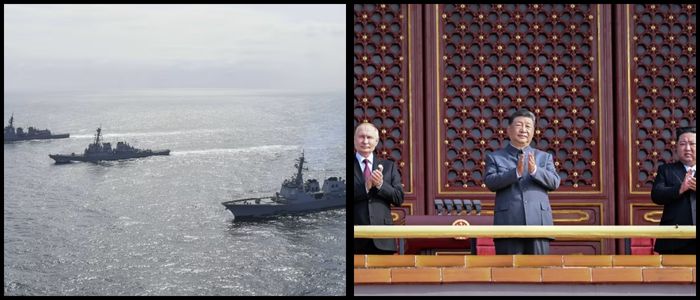Trilateral exercises amid rising tensions
The Freedom Edge 2025 drills are taking place near South Korea's southern Jeju Island. The South Korean Joint Chiefs of Staff said the intention is to address North Korean nuclear and missile capabilities and ensure overall regional stability.
The US Indo- Pacific Command characterized the exercises "as the most advanced demonstration of trilateral defense cooperation to date," and focused the drills on ballistic missile defense.
The exercise is taking place simultaneously as Resolute Dragon, a large bilateral exercise between the US and Japan that includes deploying potential strike missile systems to mainland China.
The exercise was planned before the parade, but conveys the atmosphere of military alignment between China, Russia, and North Korea.
Up to now, North Korea has already deepened cooperation with Moscow by deploying soldiers and weaponry in direct support of Russia's war on Ukraine and signing a mutual defense agreement.
Experts caution that North Korea could obtain pieces of Russian missile technology that would enhance the nuclear track. Lately, the non-inclusion of “denuclearization” in the meetings Xi Jinping had with Kim Jong Un on Chinese soil was dubbed a tacit acceptance of North Korea's nuclear status.
Rivals Respond
North Korea's Central Military Commission, for example, condemned Freedom Edge as "the most comprehensive and offensive war drill for aggression was the largest ever held on the Korean peninsula," and Vice-chairman Pak Jong Chon echoed that Washington and its allies were working to create a dangerous situation and undermine security in the region. Moreover, China expressed its opposition to US plans to deploy the Typhon missile system in Japan for Resolute Dragon.
Experts, however, note that China's parades and allied exercises take on different significance. According to Leif-Eric Easley of Ewha Womans University, the parades in China signal the gathering of authoritarian states, while the US-led exercises were "more practical cooperation."
Additionally, Hong Min of the Korea Institute for National Unification noted that these exercises signify a security relationship that has persisted prior to the current economic disputes among Washington, Seoul, and Tokyo.
Not just limited to Korea and Japan, Washington has expanded these exercises across the Indo-Pacific region. The US, Japan, and the Philippines have recently exercised in the South China Sea, and last week, US-British warships transited through the Taiwan Straits, resulting in condemnation from Beijing. The US stated that the transits were a show of freedom of navigation on the high seas through waters deemed international waters.
A Message of Solidarity
As a whole, these exercises underline Washington's commitment to uphold "iron-clad" alliances in the region. Former Pacific Command official Carl Schuster stressed this represents a higher level of interoperability among America's allies.
Additionally, statements from the US Indo-Pacific Command emphasized the trilateral cooperation between South Korea and Japan sends an unequivocal message of "unwavering commitment to the defense of vital interests" as they also seek to increase deterrence from common adversaries.
World

US strengthens Asia alliances with major military drills

This week, the United States, South Korea, and Japan are conducting extensive combined exercises in one of the most conspicuous signals to counter closer defense cooperation in East Asia. The exercises come shortly after China, Russia, and North Korea showcased their nascent partnership at a major military parade in Beijing and assigned associated public legitimacy as a counterweight to the United States regional role.















